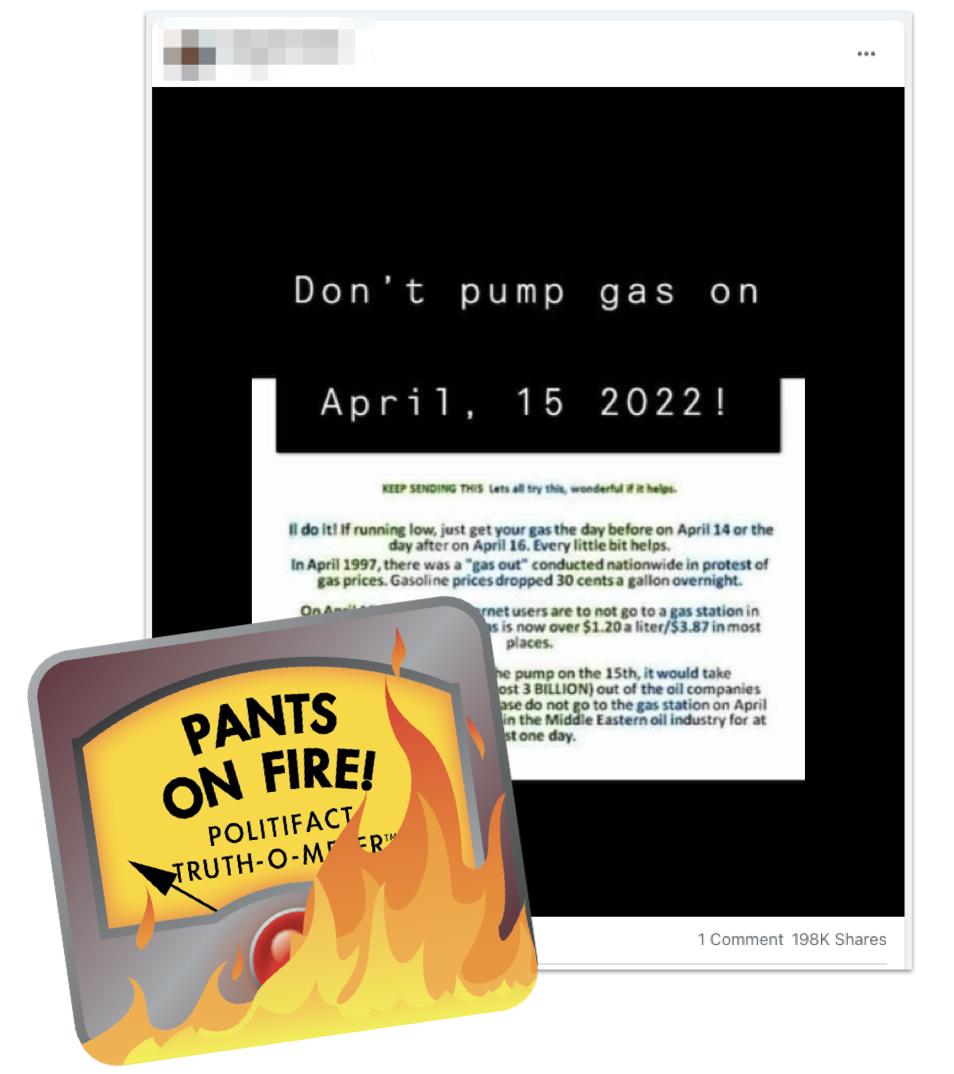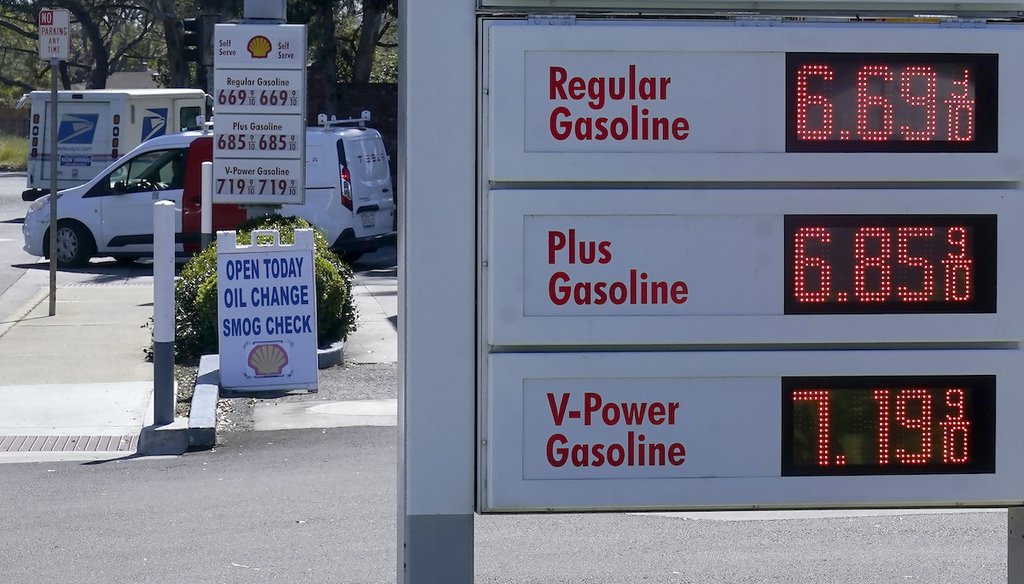

Our only agenda is to publish the truth so you can be an informed participant in democracy.
We need your help.


The gasoline price board is shown at a gas station in Menlo Park, California, on March 21, 2022. (AP )
There is no evidence a 1997 gasoline boycott reduced gas prices "30 cents a gallon overnight."
Reducing demand via a gasoline boycott could decrease gas prices, but avoiding buying gas on one day to participate in a "gas out" will likely have a limited impact, experts said.
The idea of a "gas out" has been promoted in chain emails and social media posts for decades.
In the wake of rising gas prices amid Russia’s attacks on Ukraine, social media users have revived a more than 10-year-old myth about a surefire way to drive down costs at the pump.
"In April 1997, there was a ‘gas out’ conducted nationwide in protest of gas prices," or so the long-repeated story goes. "Gasoline prices dropped 30 cents a gallon overnight."
Facing higher gas prices than Americans have seen in years, some posts, such as this one from March 17, shared a call to action: "Don’t pump gas on April 15, 2022!"
"If running low, just get your gas the day before on April 14 or the day after on April 16," it said. "Every little bit helps."
The post was flagged as part of Facebook’s efforts to combat false news and misinformation on its News Feed. (Read more about our partnership with Facebook.)
This 1997 "gas out" hoax has been circulating online for years. PolitiFact looked into it about 10 years ago and rated it Pants on Fire. Other news outlets also debunked the story in 2007, 2011 and 2019.

(Screenshot from Facebook.)
In 2012, Patrick DeHaan, a senior petroleum analyst at GasBuddy.com, told PolitiFact there’s no evidence to support the idea that a boycott drove gas prices down in 1997 and called the claim "an outright myth."
We reviewed online news archives and found no evidence of a successful gasoline boycott in 1997. There were mentions of later gasoline boycotts — including one promoted by email chains in 1999 — but, in the end, the prices of gas "had no major fluctuations," at the time of said boycotts, PolitiFact reported.
In April 1997, the average national price of a gallon of gasoline varied only slightly, according to U.S. Energy Information Administration data. Prices were as follows:
$1.203 for the week ending April 7
$1.199 for the week ending April 14
$1.199 for the week ending April 21
And $1.195 for the week ending April 28.
There was no indication from the weekly average prices that a boycott had dropped the price of gas by 30 cents overnight at any point during the month.
"Depending on ongoing market events at the time, the impact on demand could cause pump prices to decline," said Devin Gladden, a spokesperson for AAA. "However, a one-day event is likely to have a limited impact since longer-term trends could still cause prices to continue moving along that set direction."
It takes time for gas prices to respond to changes in oil prices, and oil prices are influenced by changes in supply and demand. Boycotting the purchase of gasoline for a single day is unlikely to have a significant impact. As both DeHaan and others noted, it has the effect of simply shifting sales from one day to another.
A post claimed there was a ‘gas out’ conducted nationwide in protest of gas prices. Gasoline prices dropped 30 cents a gallon overnight."
PolitiFact found no evidence to suggest that this boycott happened, and the experts we consulted in 2022 and 2012 knew of no such protest in 1997. It often takes time for gas prices to respond to changes in demand, so it is unlikely a single-day boycott would drive down prices as quickly and drastically as the post suggests, experts said.
We rate these claims Pants on Fire.
RELATED: How high are gasoline prices today, really?
RELATED: Persistent high gas prices don’t prove price gouging — and neither do comparisons to 2008 gas prices
PolitiFact, "‘Gas out’ boycott in 1997 pushed gasoline prices down 30 cents overnight, according to Facebook posts," April 15, 2012
Facebook post, March 17, 2022
Facebook post, March 17, 2022
Interview with Devin Gladden, a spokesperson for AAA, March 15, 2022
NBC News, "Why one-day gasoline 'boycott' won't work," May 6, 2007
Buzzfeed News, "A ‘Gas Out’ Day Idea To Lower Gas Prices Is Going Viral But It's Been Proven To Be Ineffective And Inaccurate," April 12, 2019
Los Angeles Times, "Myth Watch," May 6, 2007
CBS News, "National 'Gas-Out' Day Could Be A Hoax," April 14, 2011
U.S. Energy Information Administration, "Weekly U.S. Regular All Formulations Retail Gasoline Prices (Dollars per Gallon)," accessed March 21, 2022
PolitiFact, "Why are oil prices so high? And what can be done about it?" Nov. 4, 2021
In a world of wild talk and fake news, help us stand up for the facts.
